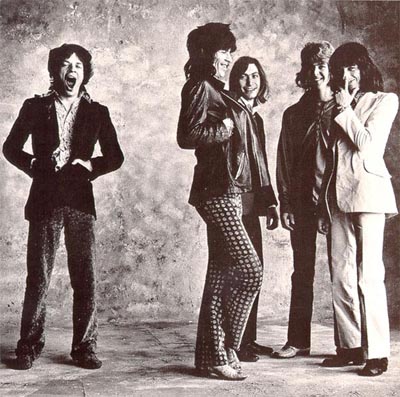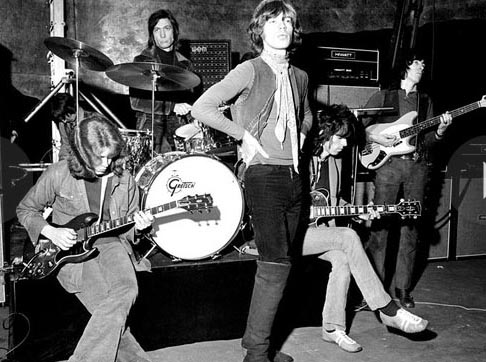Crossfire Hurricane | reviews, news & interviews
Crossfire Hurricane
Crossfire Hurricane
The gospel according to Mick, Keef, Charlie, Ron, Bill and the other Mick

What a year for great British institutions. Sixty years of Elizabeth II, 50 years of James Bond, and a half-century of the Rolling Stones. To recycle an even older cliche, we will never see the like of any of them again.
Brett Morgen's Crossfire Hurricane is a chronicle of the Stones' career, assembled from a wealth of news, documentary and home-made footage stretching back to their earliest days as a scraggy west London blues band. The commentary, other than that supplied by various interviewers and TV anchormen glimpsed across the passing decades, is provided by the Stones themselves, who have all been newly interviewed for the project. Perhaps taking a tip from the recent Ayrton Senna documentary, they're used exclusively in voice-over rather than as talking heads, so the action isn't slowed by too much yakking (mid-Sixties Stones, pictured below).
 Morgen has kept it pretty simple - do the homework, scour the planet for rare footage, cut the film in chronological order - but he's done it right in pretty much every aspect. Doing the interviews in audio-only seems to have had a liberating effect on the timeless combo, and their comments and observations seem free and sometimes even heartfelt. For once, Mick Jagger has set aside the impenetrable veneer of glib facetiousness that he usually presents to interviewers, and his shrewd, often witty contributions make a pleasing contrast with Keith Richards's old-man-of-the-sea ruminations.
Morgen has kept it pretty simple - do the homework, scour the planet for rare footage, cut the film in chronological order - but he's done it right in pretty much every aspect. Doing the interviews in audio-only seems to have had a liberating effect on the timeless combo, and their comments and observations seem free and sometimes even heartfelt. For once, Mick Jagger has set aside the impenetrable veneer of glib facetiousness that he usually presents to interviewers, and his shrewd, often witty contributions make a pleasing contrast with Keith Richards's old-man-of-the-sea ruminations.
One particular segment neatly highlights the way he and Keith have defined the twin poles of the Stones, as it were the head and the heart. Talking about the band's decision to decamp to the south of France in 1971, Keith melodramatically portrays himself as an outlaw forced to go on the run from police harassment. "Well I'm sure Keith believes that," says Jagger, "but the truth is we left because of the money." According to Mick, the choice boiled down to paying £100,000 each in tax - a substantial sum 40 years ago - or moving beyond the reach of the long arm of Her Majesty's tax inspectors. Presumably this will prompt Ed Miliband to call for a judge-led inquiry into tax-avoiding rock stars.
 One of Morgen's best decisions was to include ex-bassman Bill Wyman and former guitarist Mick Taylor among his interviewees, since many Stones fans would agree that they were part of the band's best-ever lineup during an intensely creative part of their career. Wyman, renowned as an assiduous diarist of his years in the band, gets a credit as "historical consultant".
One of Morgen's best decisions was to include ex-bassman Bill Wyman and former guitarist Mick Taylor among his interviewees, since many Stones fans would agree that they were part of the band's best-ever lineup during an intensely creative part of their career. Wyman, renowned as an assiduous diarist of his years in the band, gets a credit as "historical consultant".
 Perhaps with ol' Bill's guidance, Morgen has constructed a chain of vivid flashbacks to key episodes in the Stones's career, and though their story has been worn threadbare in countless books and documentaries, there are still moments here that can make you gasp at how strange and intense it all was. Jerky monochrome film of the Stones being mauled and manhandled by crazed punters rushing the stage during an early British tour for instance, or a floaty acid-like sequence depicting the notorious drugs raid at Keith's house in Sussex, or the terrifying ghastliness of the Altamont festival. There's a wonderfully silly clip from a TV talk show hosted by Robert Robinson, where some bloke with an -ology degree waffles on about Jagger's mystical quasi-divine aura while Jagger studiously refrains from bursting out laughing.
Perhaps with ol' Bill's guidance, Morgen has constructed a chain of vivid flashbacks to key episodes in the Stones's career, and though their story has been worn threadbare in countless books and documentaries, there are still moments here that can make you gasp at how strange and intense it all was. Jerky monochrome film of the Stones being mauled and manhandled by crazed punters rushing the stage during an early British tour for instance, or a floaty acid-like sequence depicting the notorious drugs raid at Keith's house in Sussex, or the terrifying ghastliness of the Altamont festival. There's a wonderfully silly clip from a TV talk show hosted by Robert Robinson, where some bloke with an -ology degree waffles on about Jagger's mystical quasi-divine aura while Jagger studiously refrains from bursting out laughing.
And there are chunks of peak-time Stones, rampaging round the States in 1972, Jagger pirouetting in his skin-tight jumpsuit while Keith swigs Jack Daniel's from the bottle. The film suddenly speeds to a conclusion after Richards manages to evade jail time for his 1977 heroin bust in Canada, a tacit acknowledgement that the revolutionary years were over. Jagger even admits that after that, they set out to bury their "satanic" image and become more light-hearted and showbizzy.
 Some effort has gone into giving the late Brian Jones a bit of retrospective kudos, and you can't help wondering how differently the group would have developed if he'd lived longer and not drifted apart from the others. The recording studio film of Jones playing the slide guitar part on "No Expectations" is one of countless archival nuggets, and Jagger's comment that they wished they could have done more to help the disintegrating Jones sounds... well, more sincere than Jagger usually does, put it that way.
Some effort has gone into giving the late Brian Jones a bit of retrospective kudos, and you can't help wondering how differently the group would have developed if he'd lived longer and not drifted apart from the others. The recording studio film of Jones playing the slide guitar part on "No Expectations" is one of countless archival nuggets, and Jagger's comment that they wished they could have done more to help the disintegrating Jones sounds... well, more sincere than Jagger usually does, put it that way.
And what did they miss out? All the Stones women for one thing (Marianne, Bianca, Anita et al), most of the people who worked with them (though there are shots of early manager Andrew Oldham), and any other musicians. It's the Stones, and nothing but. Drug use is acknowledged, but full-scale debauchery is confined to teasing flashes of flesh shot on their tour aeroplane. But hey, we know what we know. Watching Crossfire Hurricane, you'll know it more intensely.
rating
Share this article
Add comment
The future of Arts Journalism
You can stop theartsdesk.com closing!
We urgently need financing to survive. Our fundraising drive has thus far raised £49,000 but we need to reach £100,000 or we will be forced to close. Please contribute here: https://gofund.me/c3f6033d
And if you can forward this information to anyone who might assist, we’d be grateful.

Subscribe to theartsdesk.com
Thank you for continuing to read our work on theartsdesk.com. For unlimited access to every article in its entirety, including our archive of more than 15,000 pieces, we're asking for £5 per month or £40 per year. We feel it's a very good deal, and hope you do too.
To take a subscription now simply click here.
And if you're looking for that extra gift for a friend or family member, why not treat them to a theartsdesk.com gift subscription?

Comments
only,the very best band of
Never mind if it is or not
God bless the Rolling Stones.
I enjoy all footage of The